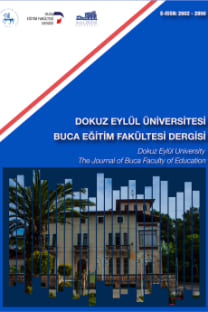İNGİLİZCE HAZIRLIK OKULLARINDAKİ OKUTMANLARIN TOPLUMSALLAŞMALARI
Bu çalışmanın amacı, deneyim, hizmet öncesi ve hizmet içi eğitim, mentörlük, tazminat ve ek ödemeler ve sosyal hizmetlerden duyulan memnuniyetin örgüte yönelik toplumsallaşma ile göreve yönelik toplumsallaşmayı ne düzeyde yordadığını ortaya koymaktır. Bu amaca yönelik olarak çalışma ilişkisel bir çalışma olarak desenlenmiş ve uyarlanan bir ölçek Ankara’da bulunan dört devlet üniversitesinin İngilizce hazırlık okullarında çalışan toplam 228 öğretim elemanına uygulanmıştır. Elde edilen verilerle yapılan doğrusal regresyon analizi sonuçları hizmet öncesi eğitim, tazminat ve ek ödemelerden duyulan memnuniyet ve sosyal hizmetlerden duyulan memnuniyetin hem örgüte hem de göreve yönelik toplumsallaşma için anlamlı bir yordayıcılar olduğunu göstermiştir. Elde edilen bulgular yükseköğretimin genel özellikleri ile Türkiye’de yükseköğretimin yapılandırılması ve işleyişi bağlamında tartışılmıştır.
Anahtar Kelimeler:
örgütsel toplumsallaşma, yükseköğretim, örgütsel kültür, öğretim elemanı
SOCIALIZATION OF INSTRUCTORS AT ENGLISH PREPARATORY SCHOOL
The purpose of this study was to investigate the predictive value of experience, satisfaction from preservice and in-service training, satisfaction from mentoring, satisfaction from compensations and social benefits for both organizational and task socialization. For this purpose, the study was designed as a correlational study and an adapted scale was administered to 228 instructors working in English preparatory schools of four public universities in Ankara. The results of study showed that satisfaction from pre-service training, compensations and social services are significant predictors for both organizational and task socialization. The results were interpreted according to the general qualities of higher education and specific structural and functional characteristics of higher education in Turkey.
___
- Austin, A. E. (2002). Preparing next generation faculty: Graduate school as socialization to the academic career. The Journal of Higher Education, 73(1), 95-122.
- Bauer, T.N., Bodner, T., Erdogan, B., Truxillo, D.M. and Tucker, J.S. (2007). Newcomer adjustment during organizational socialization: A meta-analytic review of antecedents, outcomes, and methods. Journal of Applied Psychology, 92 (3), 707-721. Birnbaum, R. (1988). How Colleges Work: The Cybernetics of Academic Organizations and Leadership. San Francisco: Jossey-Bass.
- Blackler, F. (1995). ‘Knowledge, knowledge work and organizations: An overview and analysis’, Organization Studies, 16(6), 1021–1046.
- Bogler, R. ve Kremer-Hayon, L. (1999). The socialization of faculty members to university culture and norms. Journal of Further and Higher Education, 23, 31-40.
- Boice, R. (1991a). New faculty as colleagues. Qualitative Studies in Education, 4, 29-44.
- Boice, R. (1991b). New faculty as teachers. Journal of Higher Education, 62, 150-173.
- Chao, G.T., O’Leary-Kelly, A.M., Wolf, S., Klein, H.J. ve Gardner, P. (1994). Organizational socialization: Its content and consequences, Journal of Applied Psychology, 79: 730– 43.
- Colbeck, C.L. (2008). Professional identity theory development and doctoral education. New Directions for Teaching and Learning, 113, 9-16.
- De Vos, A. (2002). The Individual Antecedents and the Development of Newcomers' Psychological Contracts During the Socialization Process: A Longitudinal Study. Yayımlanmamış Doktora Tezi, Gent Universitesi, Gent, Belçika.
- Fraenkel, J., Wallen, N. ve Hyun, H. (2011). How to Design and Evaluate Research in Education (8. baskı). New York: McGraw-Hill.
- Haueter, J., Macan, T.H. ve Winter, J. (2003). Measurement of newcomer socialization: Construct validation of a multidimensional measure. Journal of Vocational Behavior, 63, 20-39.
- Ibarra, H. (1999). Provisional selves: Experimenting with image and identity in professional adaptation, Administrative Science Quarterly, 44, 764-791.
- Jex, S.M. ve Britt, T.W. (2008). Organizational Psychology: A Scientist-Practitioner Approach (2. baskı). Hoboken, NJ: John Wiley & Sons, Inc.
- King, R. C. ve Sethi, V. 1998. The impact of socialization on the role adjustment of information systems professionals. Journal of Management Information Systems, 14 (4), 195-217.
- Lindholm, J.A. (2004). Pathways to professoriate: The role of self, others, and environment in shaping academic career aspirations. Journal of Higher Education, 75, 603-635.
- Louis, M.R. (1980). Surprise and sense making: What newcomers experience in entering unfamiliar organizational setting. Administrative Science Quarterly, 25, 226-251.
- Murray, J.P. (2000). New faculty’s perceptions of the academic work life. The Association for the Study of Higher Education Yıllık Toplantısında Sunulmuş Bildiri, Sacramento.
- Oakes, L.S., Townley, B. ve Cooper, D.J. (1998). Business planning as pedagogy: Language and control in a changing institutional field. Administrative Science Quarterly, 34, 257-292.
- Reichers, A. E., Wanous, J. P. ve Steele, K. (1995). Design and implementation issues in socializing (and re-socializing) employees. Human Resource Planning, 17 (1): 17
- Reybold, L.E. (2005). Surrendering the dream: Early career conflict and faculty dissatisfaction thresholds. Journal of Career Development, 32, 107-121.
- Reynolds, A. (1992). Charting the changes in junior faculty. Journal of Higher Education, 63, 637-657.
- Saks, A. M. ve Ashforth, B. E. (1997). Organizational socialization: Making sense of past and present as a prologue for the future. Journal of Vocational Behavior, 51, 234–279. Sands, R.G., Parson, L.A. ve Duane, J. (1991). Faculty mentoring faculty in a public university. Journal of Higher Education, 62, 174-193.
- Taormina, R.J. (2004). Convergent validation of two measures of organizational socialization. International Journal of Human Resource Management, 15, (1), 76-94.
- Taormina, R.J. (1994) The organizational socialization inventory. International Journal of Selection and Assessment, 2, 133–145.
- Tierney, W.G. 1997. Organizational socialization in higher education. Journal of Higher Education, 68, 1-16.
- Thompson, W.E. ve Hickey, J.W. (2008). Society in Focus, 6. baskı. Boston: Pearson Education.
- Trowler, P. ve Knight, P. (1999). Organizational socialization and induction in universities: Reconceptualizing theory and practice. Higher Education, 37, 177-195.
- Van Maanen, J. ve Schein E.G. (1979). Toward a theory of organizational socialization, B.M. Staw ve L.L. Cummings (Eds.) Research in Organizational Behavior, 1, 209-264. Greenwich, CT: JAI Press.
- Yi, X., ve Uen, J.F. (2006). Relationship between organizational socialization and organizational identification of professionals: Moderating effects of personal work experience and growth need strength. The Journal of American Academy of Business, 10(1), 362-371
- Yayın Aralığı: Yılda 4 Sayı
- Başlangıç: 1992
- Yayıncı: Dokuz Eylül Üniversitesi
Sayıdaki Diğer Makaleler
Meral ÖNER SÜNKÜR, Sabahattin ARIBAŞ, Mustafa İLHAN, Murat SÜNKÜR
Yasemin ABALI ÖZTÜRK, Çavuş ŞAHİN
Ayşegül YILDIRIM BENLİ, Nevzat KAVCAR
ORTAÖĞRETİM ÖĞRENCİLERİNİN VE ÖĞRETMENLERİNİN EĞİTİM ARAŞTIRMALARINA BAKIŞI
Emel YEŞİLKAYALI, Vesile YILDIZ DEMİRTAŞ
İNGİLİZCE HAZIRLIK OKULLARINDAKİ OKUTMANLARIN TOPLUMSALLAŞMALARI
